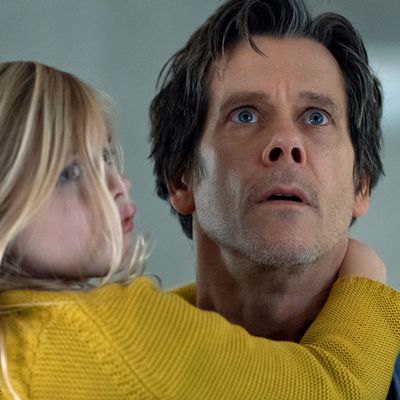
If there’s one thing in the new Blumhouse horror film, You Should Have Left, that works well, it is this: Kevin Bacon movingly plays the part of a man whose self-hatred is slowly consuming him. As Theo Conroy, a disgraced screenwriter starting to have suspicions about his younger movie-star wife, Susanna (Amanda Seyfried), Bacon carries himself with a mixture of rangy authority and creeping anxiety. There’s always been a fretful, vulnerable undercurrent to the actor’s surface cool, and it’s in full force here. He’ll walk into a room with cocksure speed — but you wonder if he might dissolve at the first unkind word.
If only he hadn’t been tossed into the middle of a hopelessly tired, nebulous horror scenario. You Should Have Left surrounds Theo with so many generic, half-baked genre clichés that it wipes out any promise of complexity or emotional power. Theo, Susanna, and their 6-year-old daughter, Ella (Avery Tiiu Essex), have arrived in rural Wales hoping to get away for a bit before Susanna starts a shoot in London. They have found what seems like the perfect house: a somewhat brutalist mansion in the middle of nowhere, with blocky, spare, modernist interiors. Pretty quickly, however, things seem off. Theo discovers a previously unknown part of the house, and after he wanders through it, we realize that many hours have strangely passed, as if he’s entered a time warp. Also, who’s been writing in his journal? And who is that creepy man visiting Theo’s daughter in his dreams? And why is the local shopkeeper being such a dick?
Who cares? The answers to all these questions are, sadly, obvious and — tragically — inane. You Should Have Left eventually settles into a Shining-style mysterious-house thriller, but instead of heightening suspense, each new development seems to dissipate any tension that’s been built. That’s in part because the house is far less interesting than the characters, and director David Koepp — a fine screenwriter who’s had a mixed directorial career — never quite manages to establish the connection between Theo’s own demons and the building’s in a compelling way. Or rather, he waits until the end of the movie to do so, and spends the previous hour-plus leaving things unspoken and uncertain, presumably to keep us guessing as to how it will all come together. He shouldn’t have bothered; several late-inning plot twists and developments are painfully transparent early on, including one from the film’s earliest frames. We’re one step ahead of the movie, which wouldn’t be so bad if the movie didn’t seem to think it was two steps ahead of us.
It might have worked as a drama, but as horror, it’s a disaster. (You Should Have Left is an adaptation of a novel by Daniel Kehlmann, which I have not read but which I’ve been assured is excellent.) Still, even as the film dithers around with vague backstories and all sorts of running in and out of corridors and stairwells and mysterious passageways that all kind of look the same — and thus, not particularly scary or disturbing — there’s just enough in Bacon’s performance to keep us moderately interested. Theo’s affection for Ella, with whom he’s left alone for a significant chunk of the film, is clear, and we understand his desire to protect her. But even there, it feels like we’re doing much of the work the film itself should be doing. Any potential threat to Ella feels nebulous, and the girl herself doesn’t seem all that frightened. Maybe that’s the point. Maybe You Should Have Left is a movie about a man lost among his own ghosts, a man struggling to convey his fear and torment to those watching him, and failing to do so. Well, mission accomplished, I guess.
More Movie Reviews
- The Accountant 2 Can Not Be Taken Seriously
- Another Simple Favor Is So Fun, Until It Gets So Dumb
- Errol Morris Has Been Sucked Into the Gaping Maw of True Crime


